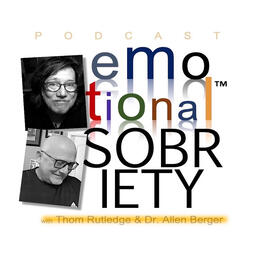
Emotional Sobriety: The Next Step in Recovery
Bill Wilson, co-founder of Alcoholic's Anonymous, wrote in 1952, "If we examine every disturbance we have, great or small, we will find at the root some unhealthy dependence and its consequent demand." Wilson suggested that if we could identify and continually surrender these unrealistic and unrecognizable demands, that we may then be able to accomplish what he imagined to be recovery's next frontier - something he called emotional sobriety. Flash forward 70 years, and join psychotherapists and best-selling authors Thom Rutledge and Dr. Allen Berger, who have taken up the mantle of exploring Bill Wilson's new frontier. Welcome to Emotional Sobriety.
Show episodes
This week we talk about taking better lessons from our mistakes. In finding our emotional center of gravity, recognizing we’re sick rather than stuck, we try to trust the process instead of controlling the outcome. To participate in Thom’s Inner Child Workshop on Saturday, June 21st @ 10am CST, email him here: thomru
Allen, Thom, and Patrick discuss the recent political upheaval and encroaching fascism of Trump and ICE. Allen relates the tension between our obligations to society and commitment to ourselves to a quote from Eric Fromme. Emotional sobriety is found in adapting, but not at the expense of becoming. Then, Patrick talk
Samantha was a psychologist before she found recovery, and her experience with the 12 Steps is just one touchstone in her evolving relationship to life in pursuit of greater emotional sobriety. This week she chats with Allen and Thom about her recent experience at Recovery Reimagined in Dublin, what we mean by “Recover
Having returned from the second annual Recovery Reimagined conference in Dublin, Patrick reflects on the passing of a longtime sober friend who took his own life. Allen and Thom offer their own professional and personal experiences with suicide, depression and “anti-self”, which maximizes our life’s problems while mini
Allen, Thom, and Patrick welcome addiction psychiatrist Carl Erik Fisher of Columbia University to discuss emotional sobriety. In the pursuit of “making sense of what happened to him” after his addiction hit a point of critical mass and he decided to seek help, Dr. Fisher wrote The Urge: Our History of Addiction and be
When we try to wrestle security from life, we often get pinned. Joe Chisholm offers us this: Dee Hock (1929-2022) wrote: “Life is not about control; it is not about getting; it is not about having or knowing. It is not even about being. Life is eternal, perpetual becoming, or it is nothing. Becoming is not a thing
